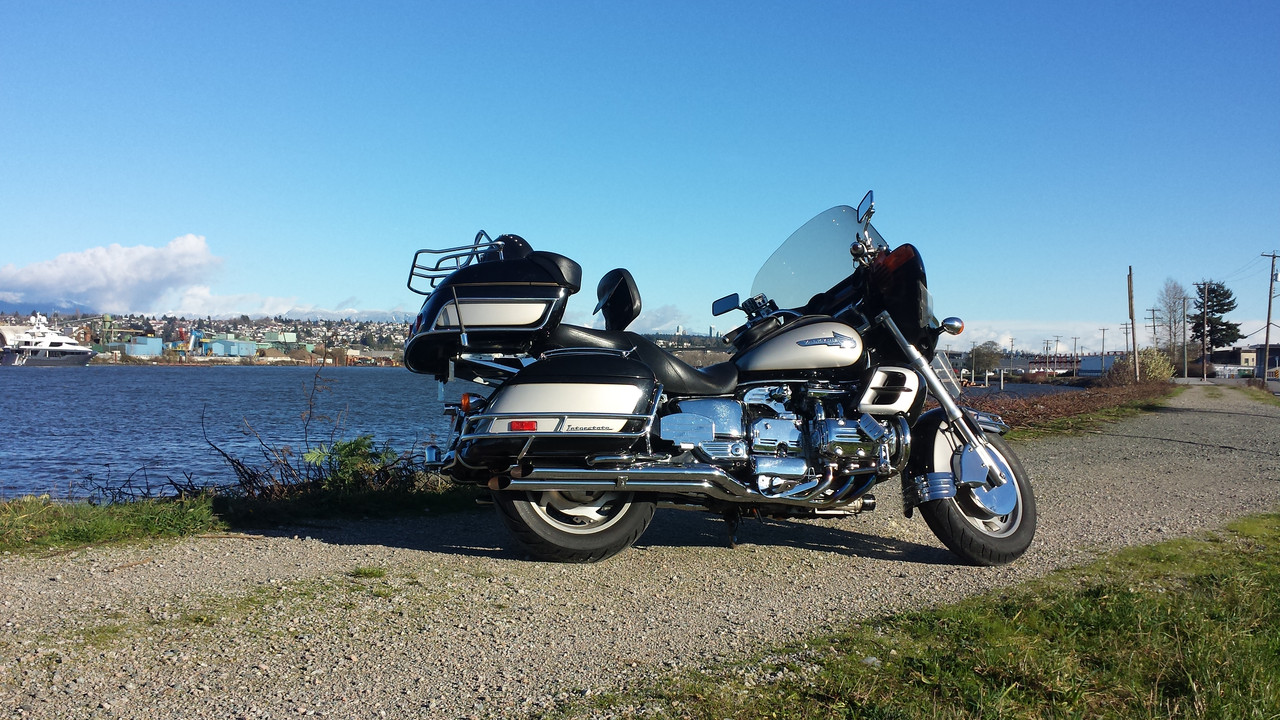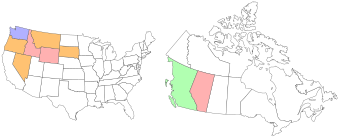|
sandy
|
 |
« on: November 01, 2020, 03:00:54 PM » |
|
|
|
|
|
|
 Logged
Logged
|
|
|
|
|
Mooskee
|
 |
« Reply #1 on: November 01, 2020, 04:02:30 PM » |
|
That is an eye opener.
|
|
|
|
|
 Logged
Logged
|
|
|
|
|
old2soon
|
 |
« Reply #2 on: November 01, 2020, 06:53:55 PM » |
|
Had mine treated with Marine Stabil after I went down in Aug 16. After a new battery and some truck driver sailor type threats she Finally fired up in summer 17. Kinda like an old John Deere tractor BUT It DID fire on the old gasoline treated with the Marine Stabil. Got an 11 mile loop here and I did a number of loops burning down the old gasoline. The difference in Phatt Ghurl with the frsh fuel was AMAZING. BUT it did Run on the old treated fuel. And my curiosity was was answered. I Ever git in that situation again-long lay up-I WILL drain the tank and go with fresh fuel from the gitgo.  BUT the storage routine WILL be Identical. I already KNOW Marine Stabil Works!  RIDE SAFE. |
|
|
|
|
 Logged
Logged
|
Today is the tommorow you worried about yesterday. If at first you don't succeed screw it-save it for nite check. 1964 1968 U S Navy. Two cruises off Nam.
VRCCDS0240 2012 GL1800 Gold Wing Motor Trike conversion
|
|
|
gordonv
Member
    
Posts: 5766
VRCC # 31419
Richmond BC
|
 |
« Reply #3 on: November 01, 2020, 07:52:11 PM » |
|
I looked over the video again, it was regular Stabil. I wonder if the Marine version would be any better?
It looks like I might be looking for non ethanol fuel for the next storage season, or drain my tank and add it to it, since I didn't get it on the road this year.
|
|
|
|
|
 Logged
Logged
|
1999 Black with custom paint IS   |
|
|
|
Jack B
|
 |
« Reply #4 on: November 02, 2020, 04:32:47 AM » |
|
I have used Sea Foam for storage and cleaning carbs, and it works great. I've had small engines that ran poorly and I would pour Sea Foam in the carb and after a few days it would run better unless it's really bad.
This year I'm going to tying Star Tron because I heard it's also great and it's cheaper to use.
They all work if you use them,but I never stored any engine longer then 4 months.
|
|
|
|
« Last Edit: November 02, 2020, 04:39:01 AM by Jack B »
|
 Logged
Logged
|
Let’s RIDE
|
|
|
MarkT
Member
    
Posts: 5196
VRCC #437 "Form follows Function"
Colorado Front Range - elevation 2.005 km

|
 |
« Reply #5 on: November 02, 2020, 05:58:23 AM » |
|
Interesting. I've used Seafoam as a gas preservative. Generally use B-12 to clean out deposits & periodic use just in case. Thankfully around 5 years ago we got pure gas midgrade locally and that's all I use except when on the road, and have to use premium for George (supercharged). Try to get last gas fillup there when returning on trips locally. Fortunately we are semi-arid here, humidity typically around 15%. All of my stored gas for the generator, weed whacker etc. is non-ethanol, dated and renewed never over a year - gets older I put it in the SUV and replace it.
|
|
|
|
« Last Edit: November 02, 2020, 06:23:16 AM by MarkT »
|
 Logged
Logged
|
|
|
|
|
Mooskee
|
 |
« Reply #6 on: November 02, 2020, 08:14:33 AM » |
|
After replacing the carb on my power washer, I started running it on ethanol free gas. When putting it in storage, I run it dry and then put Trufuel in it. https://trufuel50.com/4-cycle-mix/. This evolved from my chainsaw. When I bought the chainsaw the dealer told me to use a premixed 50:1 canned fuel. The shelf life unopened is 5 years, and 1 year after opening. Since I do not use the chainsaw much, expensive canned fuel is not a problem. I've never had a problem with it starting or running after months of non use. Because of this experience I decided to use the 4-cycle Trufuel in my power washer when putting it up. I haven't had any problems with it starting or running either, and I use it once a year. I have no idea what they put in Trufuel. I wonder if you had to put your bike up for the winter, if running it dry and draining the carbs, then dumping a can of the 4-cycle fuel in the tank might do the trick? |
|
|
|
|
 Logged
Logged
|
|
|
|
|
Top Cat NJ
|
 |
« Reply #7 on: November 02, 2020, 01:15:15 PM » |
|
WOW science! gordonv mentioned Stabil marine, this what it claimed it would do, it looks like it addresses ethanol blends and moisture that were the concerns from the video. KU: 22250
$12.99 – $133.29
4.9
(62)
America’s most trusted fuel additive brand
Engineered to combat the effects of harsh marine climates
Ultimate defense against the harmful effects of ethanol blended fuels
Industry leading water removal properties
Cleans the fuel system and ensures your engine is operating at peak performance
Keeps fuel fresh for up to 12 months
Ideal for boats, jet ski’s and other watersport engines
|
|
|
|
|
 Logged
Logged
|
|
|
|
|
Ken aka Oil Burner
|
 |
« Reply #8 on: November 02, 2020, 06:10:43 PM » |
|
This is a copy/paste from a thread on the ADVrider forum by a member called Sparrowhawk. These are not my words, nor do I claim it as fact. I did find it interesting, though. Here it is:
Another fun video from FortNine. I always enjoy Ryan's work. As a chemist that has spent a few years working in the lab of an oil refinery doing product R&D and process control I see a couple of problems with the methodology used in the video. The most glaring is that it is totally based on the assumption that the addition of ethanol in gasoline is the sole reason that gasoline degrades and causes problems during long-term storage. This is not surprising that, given his age, he probably started driving about the time E10 was mandated in most areas in North America. Being more than twice Ryan's age I understand that gasoline degraded with age and caused problems long before the addition of ethanol. That doesn't mean that alcohol can't cause problems or provide benefits during long-term storage but the chemistry and biology are much more complicated than Ryan's video.
Petroleum hydrocarbons react with oxygen and ozone resulting in the formation of polymers that are typically called "varnish" when they show up in fuel systems. These polymers are not very soluble in gasoline and settle to the bottom of carb bowls and clog filters and injectors.
As other old timers may have noticed, varnish and foul smelling old gas are not as much a problem today as they used to be, with or without adding stabilizers. In the USA we can thank pollution regulations for the improved stability of gasoline. Varnish causes problems in fuel systems that result in more pollution. It was back in the early and mid 1990s that fuel regulations began being implemented to reduce ozone and SMOG. One of those was EPA's 1996 deposit control additive program meant to ensure all gasoline contains additives to limit formation of varnish deposits. These additives are a combination of detergents and anti-oxidants. Today's gasolines are much more stable with age than they used to be.
Regarding ethanol it's good news/bad news for fuel systems.
Bad news - the rubber and gasket materials used in vehicles built before 2005 could be incompatible with ethanol. Newer vehicles contain materials that are compatible with ethanol.
Bad news/good news - ethanol can be corrosive to some metals like aluminum and magnesium. These metals when exposed to air or water form a protective oxide layer that prevents further oxidation. That does not happen with ethanol. (metal + alcohol = soluble metal alkoxide) The good news is that ethanol absorbs some water from the atmosphere and the water in the ethanol reacts with the metal to form the protective oxide layer.
Bad news - a common bacteria, Acetobacter aceti, can consume alcohol in fuels and produce corrosive acetic acid. This is the bacteria that changes wine into vinegar.
Regarding non-ethanol gasoline it's also good news/bad news.
With or without ethanol, all gasoline in the developed world is required to contain oxygenators to reduce pollution. So, ethanol free gasoline contains a different oxygenating chemical, you just don't know what it is.
Gasoline without ethanol needs to contain higher concentrations of aromatic petroleum hydrocarbons to increase the octane rating. These aromatic hydrocarbons are more harmful to modern rubbers and gasket material than either ethanol or straight chain hydrocarbons.
PerazziMx14 said: ↑
This just hit yesterday I've bene encouraging folks to look at the MSDS/SDS for year to see what they are actually over spending on.
The misconception with MSDS/SDS is that they provide information on all the chemicals in a product. That's not exactly true. According to EPA, "Per 1910.1200(g)(2)(iii), all ingredients that are classified as health hazards and are present at or above their cut-off/concentration limit or present a health risk below the cut-off value/concentration limit must be listed in Section 3 of the SDS."
Chemicals that are not classified as health hazards are not required to be listed and manufacturers can list some chemicals as proprietary. MSDS/SDS are a great benefit to workers and the public but do have limitations regarding the information they provide.
|
|
|
|
|
 Logged
Logged
|
|
|
|
|

